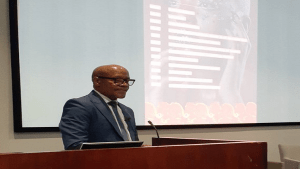The Higher Education and Training department has warned that people who qualify fraudulently for the National Student Financial Aid Scheme (NSFAS) will face the full might of the law.
Speaking at a briefing in Pretoria, on Tuesday, Minister Blade Nzimande, says student debt poses a threat to the future sustainability of higher education institutions.
Current student debt stands at R16.5 billion. Nzimande says NSFAS is finalising an upfront payments schedule for payment to universities and TVET Colleges with payments to be made by the end of the month. He says the money should go to the deserving and not to those who used fraudulent methods to qualify.
“I have urged NSFAS, working together with the DHET, to intensify efforts in identifying all the crooks who are defrauding NSFAS and benefitting illegally from its funds. We need to intently this because we are saving money so it goes where it’s supposed to go.”
Tertiary education sector institutions ready for the 2023 academic year
‘Ready for 2023 academic year’
Minister Nzimande says the post-school education sector is ready for the 2023 academic year. He says of the more than 1.1 million applications, the public university sector will be able to accommodate all qualifying students and universities will use a blended online learning method to accommodate the increasing numbers.
“Overall enrollments for 1 112 439 – that is an additional 41 545 spaces. This is an increase from last year and it shows that we have 65 427 females enrolled and 41 2428 male students.”
Nzimande has given the assurance that all students approved for the NSFAS will be allowed to enrol, while they are still waiting for the results of their NSFAS application.
26.7% of the class of 2022 achieved a bachelor’s pass and qualify for university courses.
With the demand for higher education growing steadily over the past few years, concern that many universities will not be able to accommodate everyone due to capacity issues.
“In this case, we also urge students to consider TVET Colleges as an option but not a last option we want to look at the blended distance learning to deal with capacity,” says Minister Nzimande.
A high number of students means more pressure on NSFAS.
“Current student debt is at R16.5 Billion and could be redirected at growing academic programs or improving infrastructure this is why we are working hard to conclude the consultations for a comprehensive student funding model that the Cabinet asked us to compile before the end of the financial year.”
The Minister has urged all universities to work with the department, NSFAS, and students on this matter.
“In the interim NSFAS has agreed with all the institutions to fund all the approved NSFAS-funded students to register for the 2023 financial year and this also affects all students who qualify under the history debt funds.”
This means that all NSFAS-funded students will register without having to pay anything upfront.
Nzimande says the comprehensive student funding model – to be tabled in parliament this year – will also look at the issue of the missing middle.
“There is also a challenge of missing middle funding those children who come from middle-income families and don’t benefit from NSFAS but can afford to pay out of pocket, this is being addressed within the comprehensive student funding model.”
The university registration period ends on the 20th of February. With a handful of universities open for limited late registration.
Students who don’t qualify or don’t find space have been urged to enrol at their nearest TVET college.
VIDEO | Minister Nzimande briefs the media on Higher Education’s readiness for the 2023 academic year:






